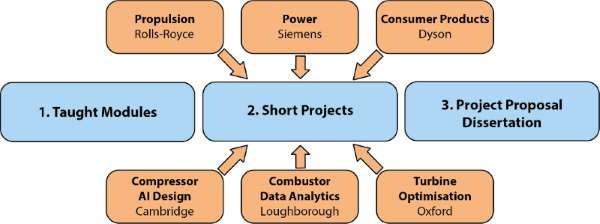The CDT in Future Propulsion and Power programme
The CDT in Future Propulsion and Power follows a "1+3" model.
In year one, students study for a new University of Cambridge master’s degree in Future Propulsion and Power. In years 2 to 4, students undertake an industrially-focussed PhD project at Loughborough University.
Year 1 MRes
The MRes in Future Propulsion and Power is a University of Cambridge degree.

Part 1 - Modules
During Part 1 of the MRes (October-December) students undertake a combination of core and elective modules. The modules give students a world-leading background in the theory of gas turbine aerodynamics as well as practical aspects of both experimental and computational research.
- Foundation concepts (Introductory course)
- Advanced turbomachinery aerodynamics (Flagship MRes course in advanced aerodynamic concepts)
- Turbomachinery aerodynamic design process (Fundamentals, and hands-on experience, of computational methods for blade design)
- Experimental methods (Practical course in experimental fluid dynamics)
- Researcher skills (Non-technical skills needed for successful research)
- Elective modules
Part 2 - Mini-projects
In Part 2 (January-April), students experience working in the research laboratories of each of the three participating universities and also in industry. The mini-projects at Cambridge, Loughborough and Oxford will focus on compressor, combustor and turbine aerodynamics respectively; the industry courses will look at the challenges of integrating these, and other, components together into a successful machine.
Part 3 - Research proposal dissertation
For the final part of the MRes (May-September), students work with an individual supervisor, and a broader team of experts drawn from the CDT partners, to develop a detailed proposal for the PhD phase.
Year 2-4 PhD Phase
The MRes provides a springboard to the PhD phase of the CDT. Students register for a PhD at Loughborough University, one of the partner universities. Loughborough University provides an internationally recognised environment for gas turbine machinery research, but CDT students also benefit from the network of experts, and the portfolio of skills, that they have built up during the MRes phase. In addition, the full cohort is regularly reunited for CDT seminars and workshop events.